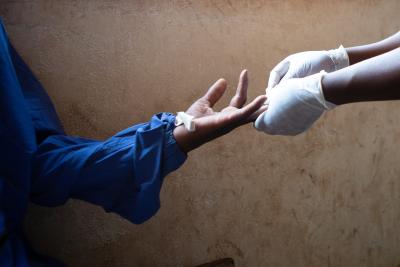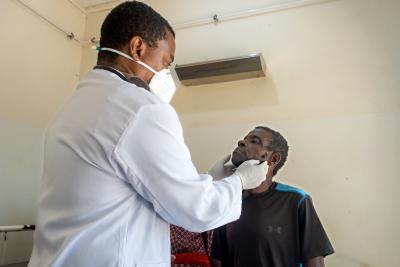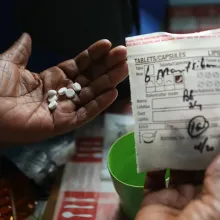HIV and TB

HIV and Tuberculosis (TB) is a program under the chronic care unit that focuses more on case finding or diagnosing and tracing to keep HIV and TB clients in care. HIV and TB coordinators conduct facility, community, and home visits to trace those who have missed clinic appointments, defaulted, or stopped treatment. The aim is to bring such clients back into care to continue with treatment.
Our Impact
Since 2007, the HIV and TB program has provided a platform for 50,000 HIV tests and counseling sessions. Currently, 8766 people have been diagnosed with HIV and enrolled in care. Furthermore, 551 adolescents living with HIV are enrolled in teen clubs, and through the program, PIH Malawi is supporting teen clubs across all 14 facilities in Neno monthly.
-
50,000HIV testing and counseling sessions
Since 2007, 50,000 HIV testing and counseling sessions have been conducted. Currently, 8766 people have been diagnosed with HIV and enrolled into care.
-
551Teen Clubs
551 adolescents living with HIV are in teen clubs.
-
14Supporting Teen clubs across the 14 facilities
To support adolescents and children living with HIV, PIH Malawi supports teen clubs across all 14 facilities in Neno monthly.
I. HIV and Tuberculosis (TB) Program: Core Activities
Partners In Health (PIH) Malawi’s HIV and TB program focuses on comprehensive case management, encompassing diagnosis, treatment, and retention in care. The program is staffed by a multidisciplinary team, including:
- HIV Manager
- HIV/TB Program Officers
- HIV Testing Services (HTS) Officers
- HIV Program Coordinator
- Integrated Chronic Care Clinic (IC3) Coordinators
- ART Clerks
- HIV Diagnostic Assistants
- TB Microscopists
- Expert Clients
II. Case Finding and Diagnosis

NCD clerk Mphatso Chammudzi sees a 54 year old patient HIV and diabetes , at Ligowe Health Centre’s IC3 clinic. The patient lives in Butao (about 7km from Ligowe).
Zack DeClerck
Case finding involves a comprehensive diagnostic approach:
Multi-Disease Testing
- PIH Malawi conducts a three-algorithm test for HIV, syphilis, and hepatitis B and C across various settings, including outpatient departments (OPD), Specialized HIV and Reproductive Health (SHARF) clinics, and IC3 clinics (particularly for patients with non-communicable diseases (NCDs). Referrals from HTS and contact tracing are also utilized.
- Early Infant Diagnosis: Exposed children are monitored up to two years of age, with testing at six weeks (Dry Blood Spots – DBS), one year, and 24 months. Viral Load Monitoring: DBS and plasma testing are employed for routine, targeted, post-viremia follow-up and repeat viral load monitoring. DBS testing is performed at Neno District Hospital, Lisungwi, and Zalewa.
TB Diagnosis:

Dimitri Suffrin, HIV Manager at PIH Malawi, left, examines tuberculosis patient Sankhulani Kanzeru before his discharge from the Neno District Hospital.
Joseph King Mizere
- Community-level case finding involves community village health volunteers referring individuals for sputum collection. Hospital-level diagnostics include sputum microscopy, GeneXpert molecular testing, urine LAM testing, ultrasound FAST TB testing, and stool testing. AI-assisted X-ray technology is utilized at Neno District Hospital.
Post-Diagnosis Care
- Patients diagnosed with TB are referred to TB focal persons for treatment initiation and registration.
III. Retention in Care and Support
TRACE System
- PIH and the Ministry of Health implement the TRACE system, a community-based reminder system, to improve adherence to care by improving retention of patients. Community Health Workers (CHWs) follow up with patients who miss appointments (2-4 weeks), while program coordina tors conduct home visits for those missing appointments for six weeks or more.
- Nutritional and Economic Support: Patients receive food packages, including Likuni Phala. Patients with multidrug-resistant TB (MDR-TB) receive specialized care at MDR clinics in Neno District Hospital and Lisungwi Community Hospital, including testing, medication refills, and follow-up.
- Expert Client Support: Expert Clients provide intensive adherence counseling for patients with viremia, ensuring optimal treatment adherence.
IV. Adolescent and Child Support
Teen Clubs
- PIH Malawi supports monthly teen clubs at 14 facilities in Neno and three hard-to-reach areas. These clubs provide a safe space for adolescents living with HIV, offering medication adherence support, educational sessions (e.g., HIV basics, gender), and screening for TB, nutrition, STIs, and mental health.
Economic Empowerment
- Adolescents are identified for support in various vocational skills, such as bricklaying, mechanics, and farming.
Community Health Worker Model:
- Initially, CHWs used a patient-assigned accompaniment model, providing individual support.
- In 2016-2018, PIH transitioned to a household model, expanding CHW’s scope to include screening, referral, and disease management for eight key health areas (HIV, TB, NCDs, STIs, maternal and child health, and malnutrition).
V. Program Coordination and Collaboration
- HIV and TB officers and HTS officers coordinate program activities, collaborate with Ministry of Health counterparts, and work with ART and TB district officers.
The program follows a holistic approach as social and economic support is provided thereby removing barriers to optimal treatment adherence.
